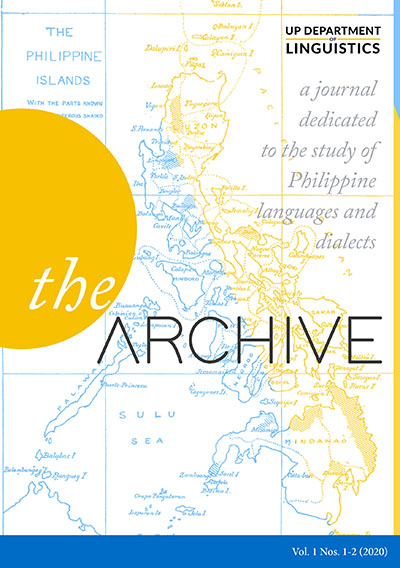On the Ethnology of the Island Chain between Luzon and Formosa
Abstract
TRANSLATOR'S NOTES:
For those familiar with German, Otto Scheerer’s writing is not so far removed from the language of today. Apart from a few minor orthographic differences and stylistic choices, the contemporary reader will have little trouble poring over his works. On the Ethnology of the Island Chain between Luzon and Formosa is one of the few pieces on the Philippines written in his native German – having been a scholar during the early American colonial period, and working at an American university, Scheerer otherwise wrote most of his academic work in English. It would take nearly half a century after the publication of On the Ethnology of the Island Chain between Luzon and Formosa before English would consolidate its position over the other European languages in global scholarly production, and one wonders if Scheerer’s choice of language was prescient or lucky or both. The ubiquity of the English language in today’s scholarly circles further serves as both background and rationale for the present translation, which hopes to introduce Scheerer’s lesser-known works to a broader contemporary audience.
While the language of the piece is still largely comprehensible, what has changed considerably is context – Formosa, for instance, is now known as Taiwan, and Botel Tobago carries the name Orchid Island (and sometimes Yami, as the reader will soon see). When dealing with historical texts, one is always forced to be cognizant of norms that no longer exist – the words baluga and savage have taken on a derogatory connotation, stained by the injustices and prejudices of empire; and Mischlinge, though a term still used in contemporary colloquial German, has been translated here in terms of what was considered acceptable academic jargon at the time, i.e., half-breeds or half-castes, both of which carry a pejorative character today. Aside from archaic racial categories, there are terms in the work that may be noteworthy for linguists and students of language alike, in that Scheerer had a propensity to label as a dialect what is now more accurately classified as a language. We hope to do the scholarly work of correcting this unfortunate oversight, the consequences of which are still felt in Philippine society,
where the word ‘dialect’ is used to describe what are in fact wonderfully diverse languages. Devoid of the changes brought about by the long anti- colonial struggle to attain dignity, the colonial and racial worldview of the early 20th century may appear to be wholly lacking in sensitivity to the modern reader. Yet when taking on such tasks of translation, or perhaps more accurately, trans-creation, in which we endeavor to transport meanings through time and different semiotic and cultural systems, we must also recognize that Otto Scheerer was very much a man of his time. As we acknowledge the issues in his work, so too should we acknowledge that it is through his writings and others like it that today’s scholars are able to help create a world beyond archaic and problematic narratives of the past.
EDITOR'S NOTES:
In July 2019, colleagues from the Department of Linguistics met with Dr. Richard Scheerer, grandson of Prof. Otto Scheerer, to discuss how to keep Prof. Scheerer's legacy alive as the Department nears its centennial celebration. This article was one of his grandfather's works that the younger Scheerer gifted to the Department. We thought of having this work translated to make it accessible to more scholars interested in the topic. Upon receiving permission from the now OAG-Deutsche Gesellschaft für Natur- und Voelkerkunde Ostasiens in Tokyo, Japan, we broached the idea to a colleague from the Department of European Languages, Prof. Frankie Cruz, who graciously agreed to do the work.


